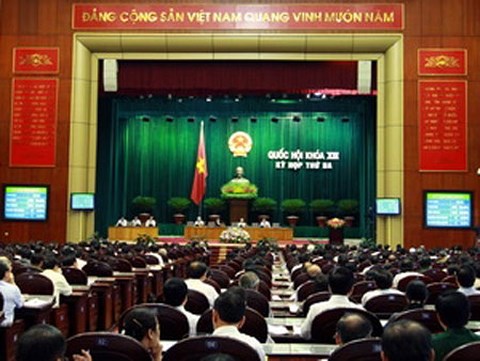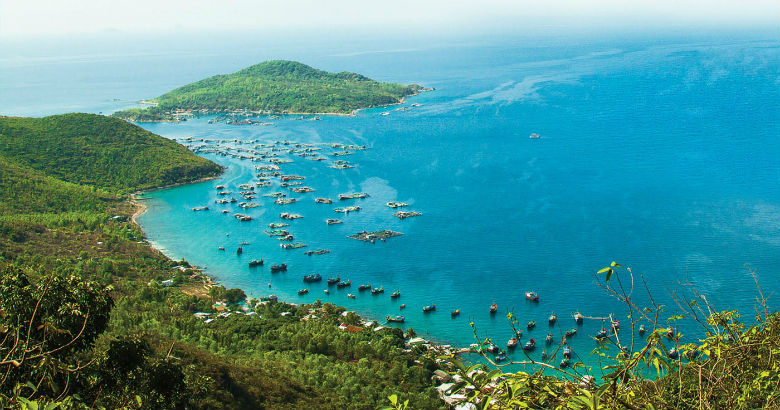Some important issues of the Law on Vietnamese sea
The point of success of the Law on Vietnamese sea is that it has detailed the provisions of the United Nations Convention on the Law of the Sea 1982 into provisions that can be applied in the waters of Vietnam. That means that the Law on Vietnamese sea has internalized international regulations to become a legal document that is easier to understand, remember and apply in practice.
The most important issue that the Law on Vietnamese sea "resolves" is the identification of sea areas and legal status for each region. The law clearly stipulates whether ships and boats of other countries have the right to freedom of navigation or not, thus, apply handling measures in case foreign ships commit illegal acts.
The Law on Vietnamese sea consists of 7 chapters and 55 articles. According to Article 1 in chapter 1, this Law provides on the baseline, the internal waters, territorial waters, the contiguous zone, the exclusive economic zones, continental shelf, islands, the Hoang Sa (Paracel) archipelago, the Truong Sa (Spratly) archipelago and other archipelagoes under Vietnam’s sovereignty, sovereign right and national jurisdiction; operation in seas of Vietnam; development of sea economy; management and protection of sea, islands.
Chapter 2 stipulates Vietnamese seas with regulations on baselines, internal waters, territorial waters, the zone being contiguous to territorial sea, exclusive economic zones, continental shelves, islands and archipelagos, etc. The provisions of this chapter spell out the legal status of the Vietnamese seas.
Chapter 3 stipulates the operation in Vietnamese seas, which mentions 13 acts considered harmful to peace, national defense and security when foreign ships pass through Vietnamese territorial waters (Clause 3 Article 23) including “any threat or use of force against the independence, sovereignty and territorial integrity of Vietnam” or “any exercise or practice with weapons of any kind, any form”.
Article 37 in this chapter also specifies provisions on banning in the exclusive economic zones and continental shelves of Vietnam such as threatening sovereignty, national defense and security of Vietnam; illegally exploring biological resources, fishing seafood; etc. Moreover, when operating in seas of Vietnam, vessels, organizations, individuals are not allowed for: illegally stockpiling, use, trading in weapon, explosive, noxious substances; trading in people, illegally trading in, stockpiling, transporting narcotics; illegal broadcast; etc.
To ensure enforcement, Article 41 in chapter 3 of the Law on Vietnamese sea stipulates tight of hot pursuit regarding of foreign vessels, according to which the Sea Patrol and Control Force has right to hot pursuit foreign vessels violating provisions of Vietnamese law if these vessels being in internal waters, territorial waters and contiguous zone of Vietnam’s territorial waters.
Right of hot pursuit is implemented after the Sea Patrol and Control Force has sent signal to request the violated vessels or vessels having signals of violating law stopping in order to inspect but these vessels did not execute. The hot pursuit may continue in the outer of limit of territorial waters or contiguous zone of Vietnam’s territorial waters if it is performed consecutively, uninterruptedly.
Moreover, the right of hot pursuit is applied to act violating the right of sovereignty, national jurisdiction of Vietnam, violations in scope of safety belt and on artificial islands, equipment, facilities on sea in exclusive economic zones and continental shelves of Vietnam. The hot pursuit of the Sea Patrol and Control Forces of Vietnam shall end when the pursuit vessels entering in territorial waters of another country.
The forces to enforce law enforcement responsibilities are specified in Article 47 of the Law on Vietnamese sea, according to which, the Sea Patrol and Control Forces include: forces with authority under the People's Army, People’s Public Security, other specialized Patrol and Control Forces. The self-defense militia of coastal centrally-affiliated cities and provinces, safeguard of organizations, agencies placing in coastal and other forces shall participate in patrol, control on the sea when mobilized by competent agencies.
Source: Thuy Anh - New Newspaper
- Key word:
- Law on Vietnamese sea
- Cases of land rent exemption and reduction under the latest regulations in Vietnam
- Economic infrastructure and social infrastructure system in Thu Duc City, Ho Chi Minh City
- Regulations on ordination with foreign elements in religious organizations in Vietnam
- Increase land compensation prices in Vietnam from January 1, 2026
- Determination of land compensation levels for damage during land requisition process in Vietnam
- Who is permitted to purchase social housing according to latest regulations in Vietnam?
-

- What is the meaning of the Law on Vietnamese sea ...
- 11:18, 30/12/2014
-

- Comparison between the international Law of the ...
- 11:36, 08/06/2014
-

- Notable new policies of Vietnam effective as of ...
- 16:26, 11/04/2025
-
.Medium.png)
- Notable documents of Vietnam in the previous week ...
- 16:21, 11/04/2025
-
.Medium.png)
- Notable documents of Vietnam in the previous week ...
- 16:11, 02/04/2025
-
.Medium.png)
- Notable new policies of Vietnam to be effective ...
- 16:04, 02/04/2025
-
.Medium.png)
- Notable new policies of Vietnam effective from ...
- 14:51, 21/03/2025
 Article table of contents
Article table of contents
